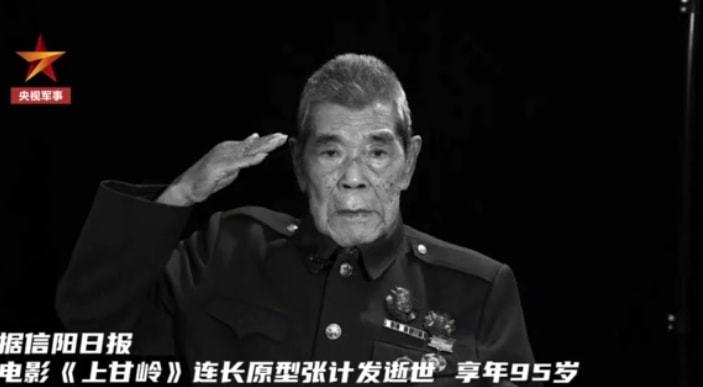Do you remember the movie Shangganling released in the 50s? The film has inspired generations of young people, including company commander Zhang Zhongfa, who has become an idol for many people. This person has a prototype, he is Zhang Jifa, the commander of the seventh company of the 135th Regiment of the 15th Army, who died on June 15, 2021, at the age of 95.

The war correspondent Li Feng's book "Decisive Battle of Korea" tells Zhang Jifa's story in detail. Zhang Jifa made great contributions to the Huaihai Campaign and the Southwest Campaign, and gradually grew from a soldier to a company commander. In March 1951, Zhang Jifa's 15th Army entered Korea, and in the autumn of 1952, Zhang Jifa participated in the Battle of Shangganling.
Before this battle, Mr. Peng called Qin Jiwei to the headquarters and said that the Five Holy Mountains were the gateway to Korea, and if we lost there, we would have to retreat backwards, and there would be no dangerous place to guard at that time. You must remember that if you lose the Five Holy Mountains, you are responsible for the future of the Korean people.
Therefore, when the Battle of Shangganling was first launched, whether it was Peng Dehuai, Qin Jiwei, Zhang Jifa as a company commander, and every ordinary volunteer soldier, they all knew that this battle must not be lost.
After the Battle of Shangganling began, Zhang Jifa clearly remembered that the mud on the 597.9 and 537.7 heights had been overturned several times by the BOMBs of the US army, and that a person stepping on it was a deep pit, and the whole leg would be trapped in the sand if he jumped. You must know that it was not sand, but a large piece of rock.
In his later years, Zhang Jifa said with great excitement: I will never forget the time during the Battle of Shangganling. Even if I had forgotten to eat and drink, I could not forget the place, too many good brothers did not come down from there alive.
In "Decisive Battle of Korea", it is said that the firepower of the American army is indeed very strong, and they quickly occupied the surface position of Shangganling, but they had no choice but to take the volunteer soldiers in the underground tunnels. During the day, Shangganling was of the U.S. army, and at night they had to bear the counterattack of the volunteer soldiers.
Later, the U.S. military began to block logistics supply lines. At first, Zhang Jifa and his warriors could still eat compressed biscuits, but as the blockade became tighter, the warriors almost ran out of water. In desperation, Zhang Jifa could only let the soldiers take the gasoline bucket to find water to drink. However, the snipers of the US army had already laid an ambush, and watching one volunteer soldier after another die on the road to fetch water like this made Zhang Jifa's heart like a knife.
In order to survive, the soldiers could only drink their own urine, Zhang Jifa hoped to boost morale, and also cheerfully said to the other soldiers: Comrades, this is our revolutionary tea, everyone must not waste.
Many people in the seventies and eighties have read the story of "An Apple". This happened in Zhang Jifa's company. At that time, the battalion commander sent some people to Zhang Jifa to send them some grenades, and one of the small soldiers also brought an apple with him. In the Shangganling position, where the logistics supply line was almost cut off, a single apple could save the life of a soldier.
There's not much to say next, because everyone knows the story. As long as it is Chinese will not forget the story of "An Apple", which is also a true portrayal of the hard work of the volunteer army.
Zhang Jifa said in an interview: "After returning from the battlefield, I have received a lot of honors, but I think the soldiers who sacrificed are the real heroes. Each of them is the loveliest person, and our country has never lacked these people.
In 1960, Zhang Jifa was diagnosed with severe liver disease by doctors, predicting that he would not live for five years. But who knew that Zhang Jifa was not afraid of this disease at all, but stubbornly fought against the disease. Another 61 years have passed since he was given a diagnosis notice and his death, and if the doctor who diagnosed him at the time knew about it, I believe he would have dropped his jaw.
Zhang Jifa's story is just one of Li Feng's "Decisive Battles in Korea." The book records the stories of more than two hundred heroic characters, including Zhang Jifa, and the stories of each character are written in great detail. In order to finish the book, Li Feng interviewed more than thirty veterans of the War to Resist US Aggression and Aid Korea, learned about their stories, and wrote these heroic figures into the book.
In his preface to "Decisive Battle of Korea," military expert Dai Xu said that china's surrounding areas are now full of hostile military fragments, while our people are immersed in peace and cannot extricate themselves, only thinking of money first, and eating a peach is too cold. Li Feng's "Decisive Battle of Korea" may in some way bring us a kind of sobering agent, allowing us to return to the battlefield of blood and fire again. "Decisive Battle of Korea" has two volumes of 600,000 words, click on the link below to buy.